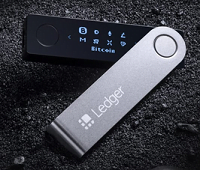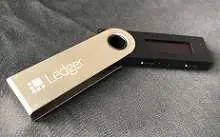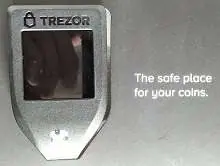10 Best Chainlink Wallets of 2024: Exploring Hardware, Desktop, Exchange, Hot, and Paper Options for Secure Asset Management
Exploring the extensive world of cryptocurrency wallets can be overwhelming, particularly when engaging with an oracle blockchain platform such as Chainlink (LINK). This guide is designed to ease your path, offering an in-depth overview of the leading Chainlink wallets in three distinct categories: hardware, desktop, and wallets based on exchanges. Each variety provides distinct benefits [...]


Exploring the extensive world of cryptocurrency wallets can be overwhelming, particularly when engaging with an oracle blockchain platform such as Chainlink (LINK). This guide is designed to ease your path, offering an in-depth overview of the leading Chainlink wallets in three distinct categories: hardware, desktop, and wallets based on exchanges.
Each variety provides distinct benefits and factors to consider, guaranteeing a choice that suits every requirement and security inclination. To view the current LINK price, you can consult our live Chainlink (LINK) price chart. A comprehensive manual on purchasing LINK is available in our Chainlink Wallets Guide 2024. The most recent updates on Chainlink news is published here.
Chainlink Hardware Wallets: A Place to Store Your Assets, More Than Just Storage
- Ledger Nano X
- Pros: Ledger Nano X is renowned for its robust security features, including a secure chip and PIN code. It supports a wide range of cryptocurrencies, including LINK, and allows for mobile connectivity via Bluetooth.
- Cons: Its high security comes with a higher price tag compared to other wallets. Bluetooth connectivity, while convenient, may raise concerns for the most security-conscious users.
- Trezor Model T
- Pros: The Trezor Model T features a touchscreen interface for improved usability and supports an extensive list of cryptocurrencies. It’s known for its open-source firmware, which enhances security transparency.
- Cons: Like the Ledger, it’s on the pricier side. The touchscreen, although user-friendly, could be susceptible to wear and tear over time.
- SafePal S1
- Pros: SafePal S1 stands out for its affordability and high-security features, including a self-destruct mechanism for tamper protection. It’s also backed by Binance, adding an extra layer of credibility.
- Cons: Its lesser-known brand might not inspire the same level of trust as Ledger or Trezor. The user interface is not as refined, which might deter less tech-savvy users.
Desktop Wallets: Combining Convenience with Security
- Coinomi Wallet
- Pros: Coinomi Wallet is streamlined and user-friendly, it enables users to securely hold their private keys and store, send, and receive LINK, while the in-built exchange facilitates the conversion of LINK to other assets.
- Cons: Not available as a web extension and not fully optimised for DeFi applications.
- Exodus
- Pros: Exodus is known for its sleek user interface and multi-currency support, making it a great all-in-one wallet solution. It also offers one-click staking for LINK.
- Cons: The lack of custom network fees might not appeal to more advanced users, and it’s not as secure as a hardware wallet.
- Atomic Wallet
- Pros: Atomic Wallet supports a wide array of cryptocurrencies, including LINK, and offers built-in exchange features. It’s also known for its strong encryption and custody-free solution.
- Cons: The built-in exchange rates can be high, and like other desktop wallets, it cannot match the physical security of hardware options.
Exchange Wallets: Ease of Use and Instant Access
- Binance
- Pros: Binance is one of the largest and most reputable cryptocurrency exchanges, offering an integrated wallet with high liquidity for LINK trading. Features 2FA for added security.
- Cons: Exchange wallets are more vulnerable to hacks, and users do not control their private keys.
- Kraken
- Pros: Kraken is known for its robust security measures and has never been hacked. It provides a seamless experience for trading and storing LINK.
- Cons: Like all exchange wallets, there’s a trade-off between convenience and the higher risk associated with not holding your private keys.
- Coinbase
- Pros: Coinbase offers a user-friendly interface perfect for beginners, insured wallets, and the ability to trade a wide range of cryptocurrencies, including LINK.
- Cons: It exercises control over your funds, and privacy-concerned users might find its KYC requirements intrusive.
Choosing Your Chainlink Wallet
Selecting the right Chainlink wallet is a crucial decision that hinges on your individual needs, preferences, and the level of security you desire for your digital assets. For those prioritizing maximum security, hardware wallets are the gold standard, offering offline storage that keeps your private keys away from online vulnerabilities. However, for users seeking more convenience and quicker access to their funds, software wallets—accessible via desktop or mobile applications—may be more appealing.
These wallets provide ease of use and are ideal for everyday transactions and active trading. It’s essential to assess the trade-offs between security and convenience, keeping in mind that the choice of wallet can significantly impact your interaction with the Chainlink ecosystem and the broader blockchain network.
In making your selection, also consider the wallet’s compatibility with other cryptocurrencies and its ability to interact with decentralized applications. A wallet that supports a wide range of assets and integrates seamlessly with the DeFi landscape can offer a more versatile and enriching user experience. Customer support, user interface, and community reviews are additional factors that can guide your decision.
Ultimately, the choice of a Chainlink wallet should align with your long-term investment strategy and how actively you plan to engage with the cryptocurrency world. Remember, the right wallet not only safeguards your assets but also enhances your journey in the ever-evolving blockchain ecosystem.
What's Your Reaction?





























































































 Private key remains offline, ensuring no contact with the Internet
Private key remains offline, ensuring no contact with the Internet No deposit insurance, as offered by a few brokers, e.g.
No deposit insurance, as offered by a few brokers, e.g. 
 OUR test champion: The Ledger Nano X
OUR test champion: The Ledger Nano X Price: 99,00 € - in the middle range
Price: 99,00 € - in the middle range













